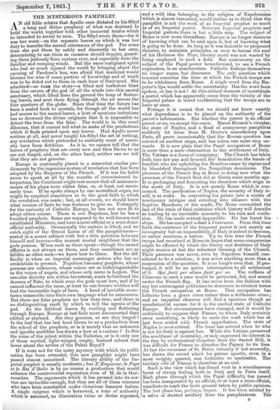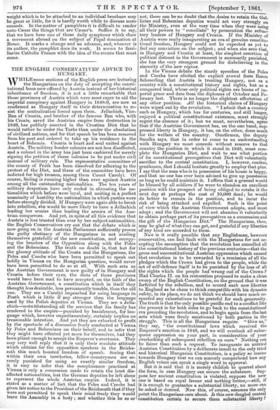'tab MYSTERIOUS PAMPHLET.
AN old fable relates that Apollo once dictated to his Sibyl a long and divine prophecy of what was destined to befal the world, together with other immortal truths which he intended to reveal to men. The Sibyl wrote them—for it was her wont—on the separate leaves on which it was her duty to inscribe the sacred utterances of the god. For some time she put them by safely and discreetly in her cave, determining to use them as occasion should require, guard- ing them jealously. from curious eyes, and especially from the familiar and romping winds. But the same malignant spirit who had so much injured the world by bringing about the opening of Pandora's box, was afraid that mankind would become too wise if some portion of knowledge and of truth was to be doled out to them in each hour of their need. She admitted—so runs the story—a blind and turbulent blast from the cavern of the god of all the winds into this sacred sanctuary, which lifted from the ground the heap of flutter- ing leaves, and sent them flying through the air across the four quarters of the globe. Since that time the future has been a sealed book to mortals, for though all the world has had access to the sacred leaves, a host of spurious imitations has so drowned the divine originals that it is impossible to detect the true from the false. The world is in this cruel dilemma, that it cannot tell what to make of the predictions which it finds printed upon any leaves. Had Apollo never written at all, and never taught his Sibyl the art of writing, any revelation which pretended to authority must of neces- sity have been fictitious. As it is, we cannot tell that the leaves of prophecy that are every now and then blown to us are not forged, and, on the other hand, neither can we tell that they are not genuine.
Europe is continually placed in a somewhat similar pre- dicament by the ingenious system of revelation that has been adopted by the Emperor of the French. If it was his habit never to speak at all by the mouths of commissioned in- terpreters, the Continent might rest secure that all announce- ments of his plans were either false, or, at least, not neces- sarily true. If he spoke always by one accredited organ, we might be sceptical sometimes as to the good faith in which the revelation was made ; but, at all events, we should know what version of facts he was desirous to give us. Unhappily for the curiosity of Catholic Europe, he has not seen fit to adopt either course. There is one Napoleon, but he has a hundred prophets. Some are supposed to be well-known and established Ministers, and have a semi-official or a semi-demi- official authority. Occasionally the curtain is lifted, and we catch sight of the Grand Lama of all the pamphleteers— seated in a secret cabinet with but a thin partition between himself and heaven—the nearest mortal neighbour that the gods possess. When such as these speak—though the sacred afflatus is not always on them, and they sometimes are as fallible as other men—we know how to listen. But the dif- ficulty is when an imperial messenger arrives who has no credentials to present. Napoleon has many prophets, whose persons are unknown, whose voices are as indistinguishable as the voices of angels, and whose only name is Legion. The oracular divinity sits within his retreat, reads beforehand the decrees of Fate, to which even the gods must bow, and if lie cannot influence the issue, at least he can foresee whither will lead the inexorable logic of facts. A band of invisible secre- taries transcribe into their own language what he announces. But there are false prophets no less than true, and there is no distinguishing mark by which to tell the agents of the god. As the fatidical leaves fly rustling and fluttering through Europe, Europe at last feels more disconcerted than edified or alarmed. Are they genuine, or are they forged ? Is the leaf that has last been blown to us a production from the school of the prophets, or is it merely that an unknown and ignoble scribbler has drawn a bow at a venture ? Is this the voice of the priest within the Tuileries, or is it only one of those myriad, light-winged, empty, bastard echoes that hover about the arches of the Palais Royal ?
If it were not for the noisy mystery with which its publi- cation has been attended, this new pamphlet might have passed almost unnoticed. The literary ability of the Im- perial prophet is usually moderate ; but L'Empereur' le Pape et is Boi d'Italie is by no means a production that would enhance the controversial reputation even of M. de la Gue- ronniere. The arguments which it has pressed into its ser- vice are invincible enough, but they are all of them veterans who have been marshalled under victorious banners before. A single epigram which is borrowed, a tone of authority which is assumed, an illustration twice or thrice repeated, and a wild idea belonging to the religion of Napoleonism i which is almost travestied, would incline us to think that the pamphlet is not the work of an Imperial prophet so much as of an Imperial parrot. Between Imperial prophets and Imperial parrots there is but a little step. The subject of Rome is now worn threadbare. Europe is no longer desirous of knowing what can be said upon it, but of knowing what is going to be done. As long as it was desirable to propound theories, to maintain principles, or even to harass the soul of his Holiness the Pope, literary merit was not wasted by being employed in such a field. But controversy ou the subject of the Papal power henceforward, to use a French expression, is an anachronism. Catholic bishops themselves no longer argue, but denounce. The only question which remains concerns the time at which the French troops are to be withdrawn from Rome. A single word from the Em- peror's lips would settle the uncertainty. Has the word been spoken, or has it not ? At this critical moment of incertitude a parrot which has apparently come from the vicinity of the Imperial palace is heard vociferating that the troops are to leave at once.
Perhaps it is meant that we should not know exactly what dependence is to be placed on the authority of the parrot's information. But whether the parrot is an official parrot or no, we accept the omen. Baron Ricasoli's circular, the state of Naples, and a flood of anonymous pamphlets suddenly let loose from M. Dentu's manufactory upon Paris, all prove incontestably that the Roman question has entered on another stage, and has taken one more step on- wards. It is now plain that the Papal occupation of Rome is more than a mere obstruction to the settlement of Italy. The Vatican is a focus of conspiracy. The Church has taken both into her pay and beneath Wer benediction the bands of banditti who are upholding the Bourbon cause by rapine and by bloodshed throughout the Neapolitan dominions. The presence of the French flag at Rome is doing now what the presence of the French fleet did at Gaeta some months ago. It is prolonging and fomenting the disorders which reign in the south of Italy. It is not merely Rome which is con- cerned. The pacification of Naples, the security of Italy it- self, is at stake. In converting his palace into a centre of reactionary intrigue and entering into affiance with the fugitive Bourbons of the south, Pio None committed the last of the train of fatal mistakes which history will describe as leading by an inevitable necessity to his ruin and confu- sion. Ho has made retreat impossible.' He has burnt his ships. He has accepted a duel a l'outrance. From this time forth the existence of the temporal power is not merely an incongruity but an impossibility, if Italy is indeed to become, or rather continue, a nation. Up to this time the French troops had remained at Rome in hopes that some compromise might be effected by which the liberty and destinies of Italy might receive at last the reluctant blessing of the Church.
Their presence was never, even by Napoleon himself, con- sidered to be a solution ; it was never anything more than a suspension of the question. It is no longer even that. If pro- longed, it will be an active interruption to all settlement of it. Qui facit per alium facit per se. The ruffians of Chiavone in such a case would be protected, fed, and armed under the French flag. It has never been the fashion with any but extravagant politicians to denounce in virulent terms the French occupation at Rome. That occupation has hitherto been a grave error rather than a deliberate crime; and an impartial observer will find a specious though an unsubstantial excuse for it in the excited state of Catholic Europe. But circumstances have changed, and it would be unfriendly to suppose that France, to whom Italy certainly owes something, is likely to undo the work which has at last been sealed with French approbation. The state of Naples is most critical. The hour has arrived when he who is not for Italy is against her. While the Vatican preserved the semblance of neutrality, or only expressed its interest in the fray by ecclesiastical thunders from the Sacred Hill, it was difficult for France to abandon the Papacy to its foes. At last the successor of St. Peter, virtually if not avowedly, has drawn the sword which his patron apostle, even in a more weighty quarrel, was forbidden to unsheathe. The tutelary role of France is therefore at an end. Such is the view which has found vent in a simultaneous burst of strong feeling both in Italy and in Paris itself. Each phase through which the Papal difficulty has passed has been inaugurated by an official, or at least a semi-official, manifesto to mark the fresh ground taken by public opinion. The last phase has, perhaps, begun. It has been saluted by a salvo of shotted artillery from the pamphleteers. The weight which is to be attached to an individual brochure may be great or little, for it is hardly worth while to discuss mere canards. In the matter of pamphlets it is difficult to render unto Cmsar the things that are Ca3sar's. Suffice it to say, that we have here one of those daily symptoms which show a movement abroad on the subject of Papal domination at Rome. It marks a change and an advance, and, whoever is its author, the pamphlet does its work. It seems to fami- liarize Catholic France with the idea of the events that must come.































 Previous page
Previous page